Custom Software Development
Software as a Solution
+ 4 more ...
Custom Software vs Off-the-Shelf: What’s Best for Your Business in 2025?

10 Jun 2025
by Nadiy, Senior Content Writer

10 Jun 2025
by Nadiy, Senior Content Writer
Custom Software Development
Software as a Solution
SaaS
Scalability
Mobile App Development
Web App Development
Custom Software vs Off-the-Shelf: What’s Best for Your Business in 2025?
Table of contents
Contact us
We will get back to you in the next 48 hours.

Custom Software vs Off-the-Shelf What’s Best for Your Business in 2025
Are you trying to decide between custom software and off-the-shelf solutions for your business? As technology advances rapidly in 2025, it's crucial to understand which software will meet your needs—whether it's a tailored solution designed for your unique business processes or a more affordable, ready-made option. Dive into this article to find out which one is right for your business and how Lizard Global can help you make the right decision.
key takeaways
When it comes to choosing the right software for your business, the decision can be overwhelming. Should you opt for a tailor-made, custom solution that meets every need? Or is it smarter to go for a ready-made, off-the-shelf solution that promises speed and convenience?
Nowadays, where technology is rapidly evolving and businesses are under constant pressure to innovate, selecting the right software is more crucial than ever. The software you choose can shape everything from daily operations to customer interactions and even future growth. But with so many options on the market, it’s essential to weigh the pros and cons of both custom and off-the-shelf solutions.
Let’s dive deep into the differences, advantages, and considerations for each type of software, and help you make an informed choice that aligns with your business goals.
What is Custom Software?
Custom software
refers to applications that are specifically designed and developed to meet the unique needs and requirements of a particular business or organization.
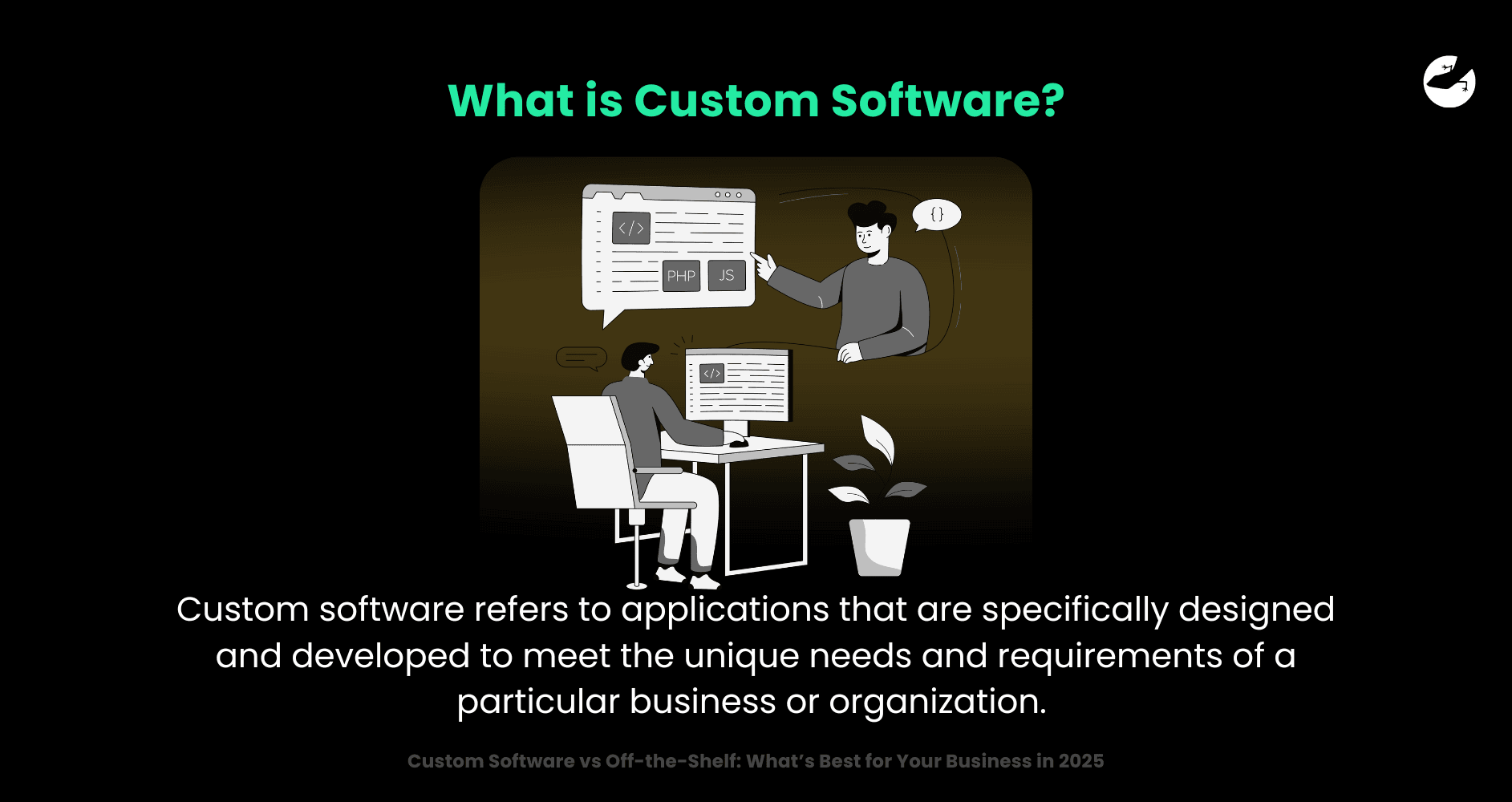
Unlike off-the-shelf software, which is built for the masses, custom software is tailor-made to provide solutions that align with your business processes and objectives.
Why Custom Software Could Be the Perfect Fit for Your Business
Custom software offers several significant advantages for businesses looking for solutions that fit their exact needs.
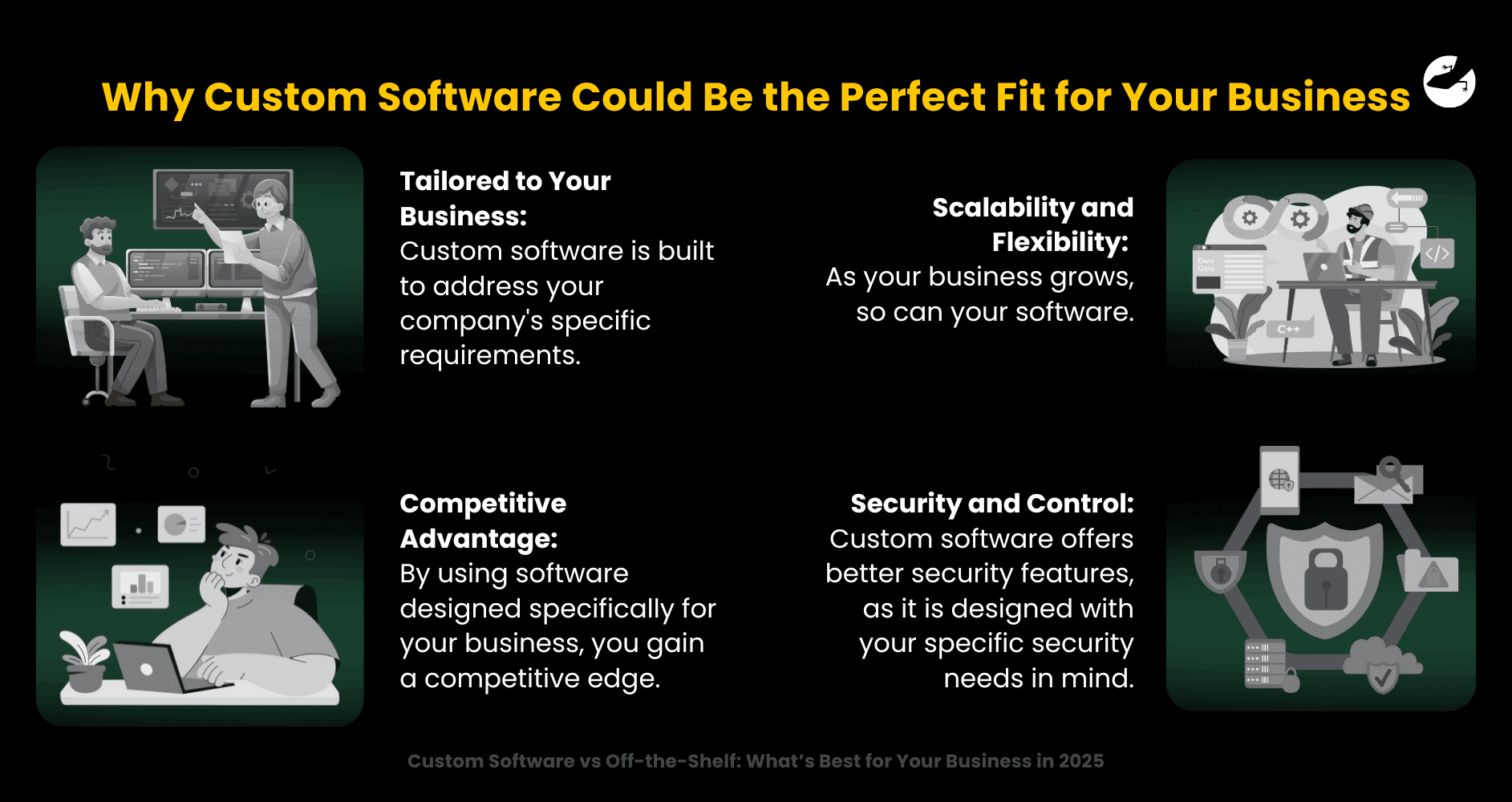
For example, if your business operates in a niche industry with specific processes, off-the-shelf software may not be flexible enough to support your unique workflows.
Custom solutions can seamlessly integrate with your existing systems and can be scaled as your business grows.
- Tailored to Your Business: Custom software is built to address your company's specific requirements. From unique business processes to specialized features, custom software can solve problems that off-the-shelf solutions might overlook.
- Scalability and Flexibility: As your business grows, so can your software. Custom software can easily be updated and enhanced to accommodate new features, users, or changes in your business model. This makes it a sustainable long-term solution.
- Competitive Advantage: By using software designed specifically for your business, you gain a competitive edge. Custom solutions allow you to be more efficient, innovative, and adaptable compared to competitors who may be stuck using generic solutions.
- Security and Control: Custom software offers better security features, as it is designed with your specific security needs in mind. You have full control over the data and how it is handled, which is critical in an era where data breaches are increasingly common.
While the benefits are clear, custom software does come with its own set of challenges. The upfront cost is typically higher, and the development timeline can be longer. However, for businesses with complex requirements or those who want to future-proof their operations, custom software is often the best solution.
What is Off-the-Shelf Software?
Off-the-shelf software refers to ready-made applications that are designed for the general market, and typically used by a wide variety of businesses.
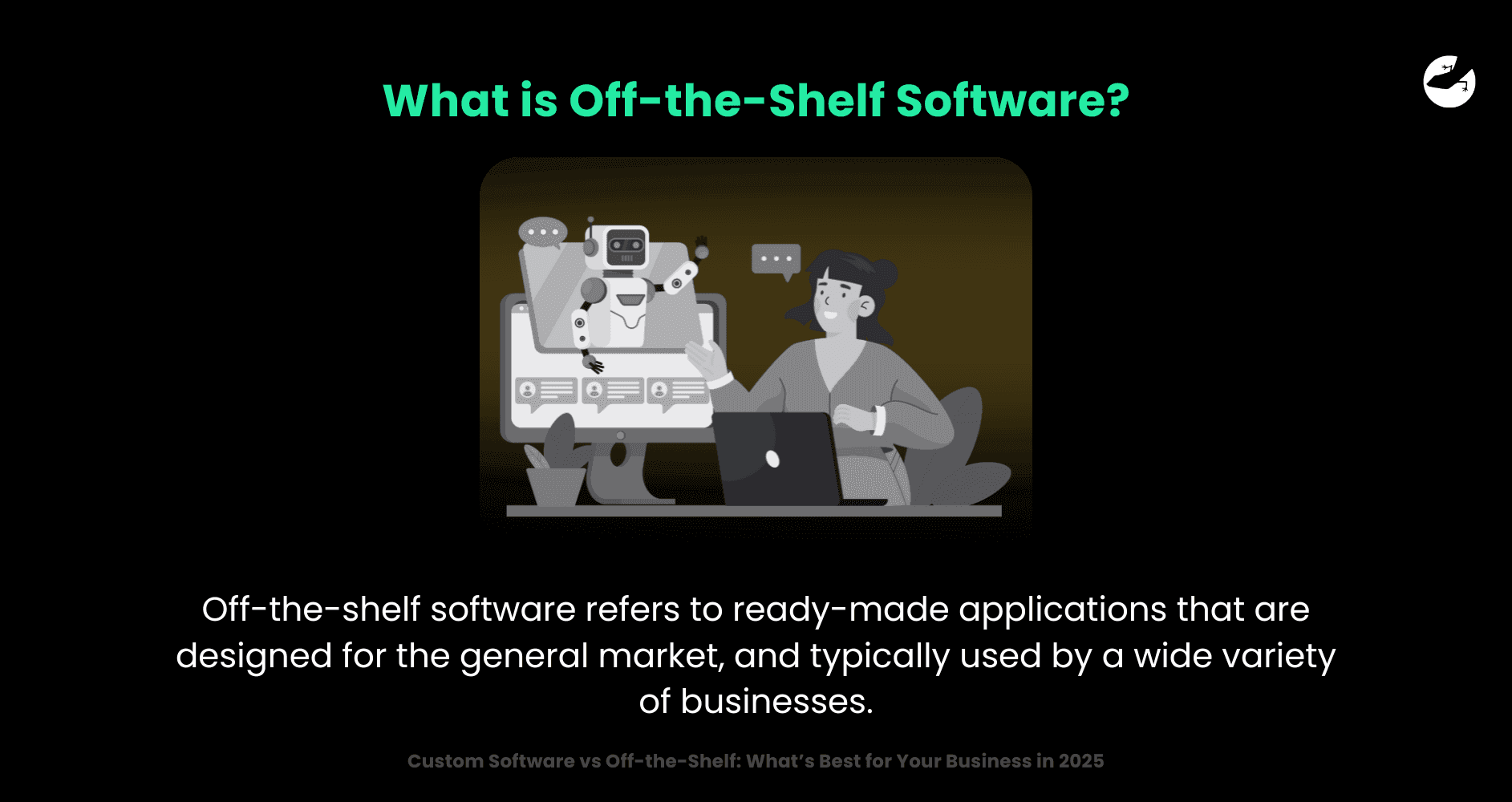
This type of software is sold to multiple customers, often through a subscription or licensing model. Popular examples include platforms like Microsoft Office, Salesforce, or Shopify.
Why Off-the-Shelf Software Might Be the Right Choice for Your Business
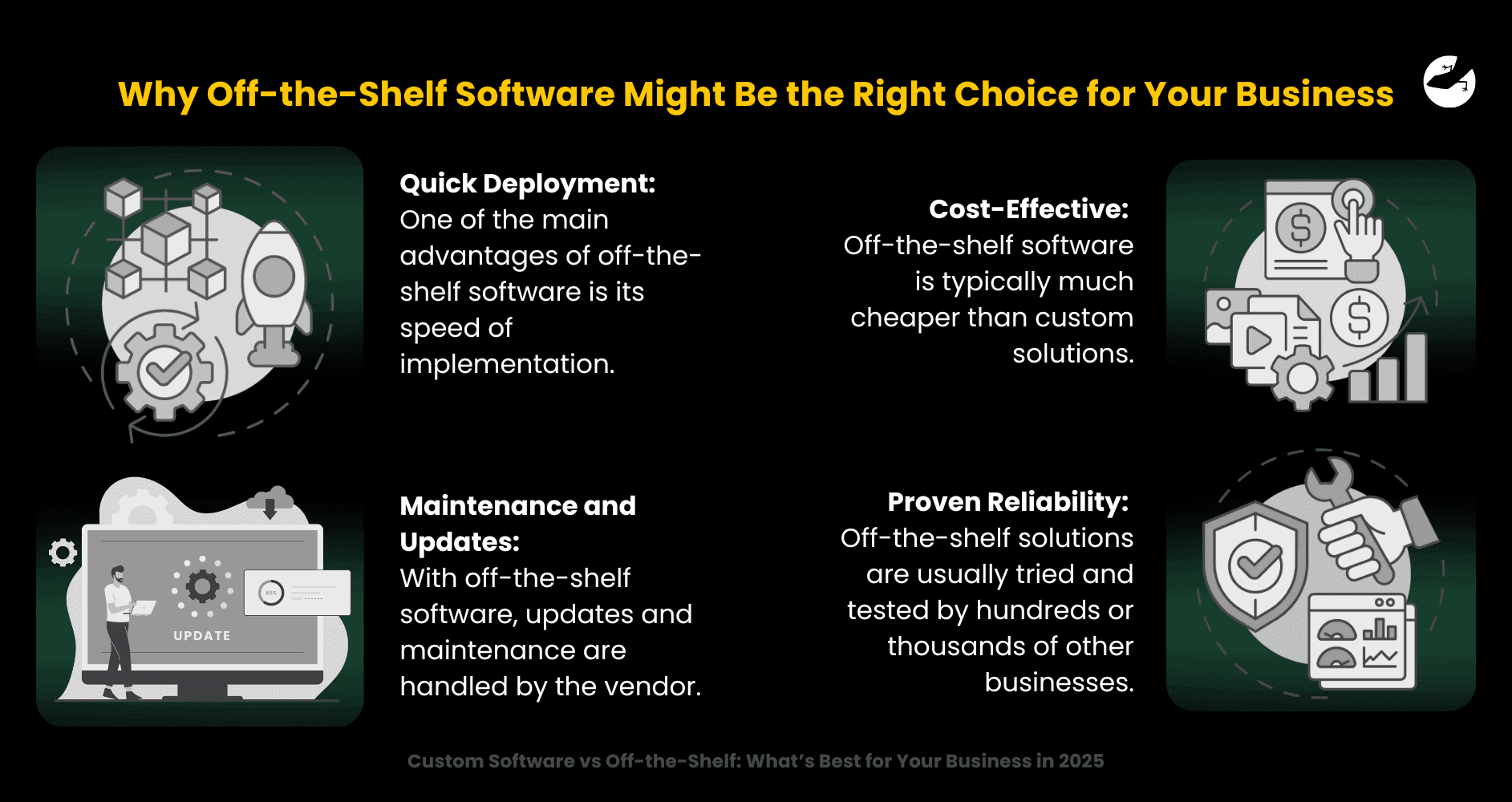
While custom software provides a tailored solution, off-the-shelf software offers a more standardized approach. For many businesses, this can be a perfect fit, especially if your needs aren’t highly specialized or you need to deploy a solution quickly.
- Quick Deployment: One of the main advantages of off-the-shelf software is its speed of implementation. Since it’s pre-built, you can start using it immediately, with minimal setup time. This makes it a great option for businesses looking for rapid solutions.
- Cost-Effective: Off-the-shelf software is typically much cheaper than custom solutions, particularly because it is built to be used by multiple businesses rather than just one. With a lower initial investment, it’s an attractive option for startups or small businesses with limited budgets.
- Maintenance and Updates: With off-the-shelf software, updates and maintenance are handled by the vendor. This means you don’t have to worry about staying on top of security patches, system upgrades, or technical issues, as the software provider takes care of this.
- Proven Reliability: Off-the-shelf solutions are usually tried and tested by hundreds or thousands of other businesses. This reliability, combined with customer support from the vendor, can make these solutions more reassuring for businesses that want to avoid any guesswork.
However, off-the-shelf solutions often come with limitations. They are designed to serve the masses, meaning they may lack the flexibility needed to accommodate your business’s specific needs. Customization options are usually limited, and if you require any adjustments, you may find yourself relying on third-party developers.
The same principle applies to building a website. A template might be fast and cost-effective, but a custom design truly brings your brand to life. Agencies such as DIGIWEDO follow this approach by crafting bespoke websites that reflect each company’s vision.
Which Is Better for Your Business in 2025?
Now that we’ve explored both custom and off-the-shelf software, it’s time to think about which one makes the most sense for your business in 2025. To make the right decision, you should consider your company’s size, budget, specific needs, and future plans.
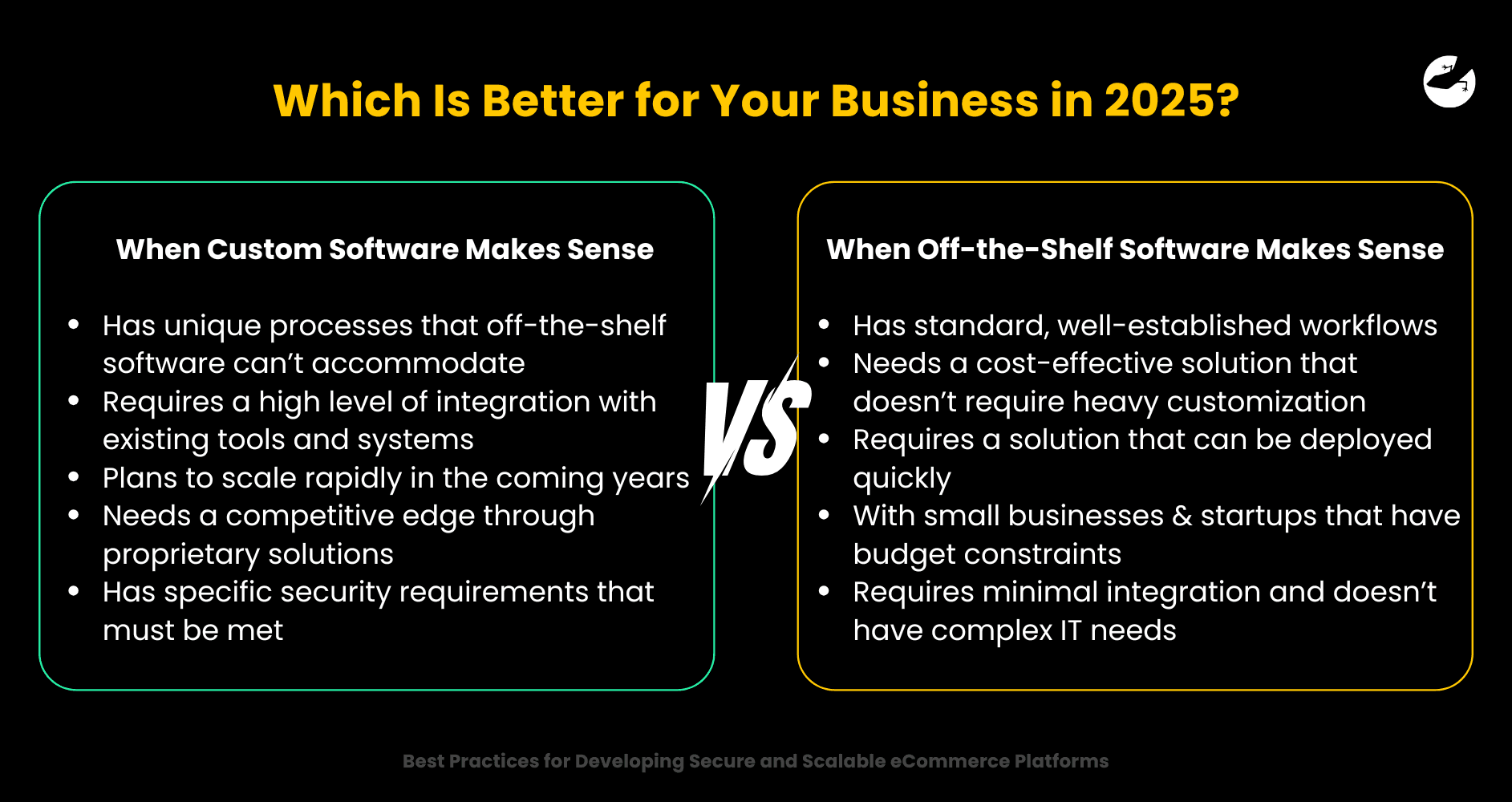
When Custom Software Makes Sense
Custom software is ideal if your business:
- Has unique processes that off-the-shelf software can’t accommodate
- Requires a high level of integration with existing tools and systems
- Plans to scale rapidly in the coming years
- Needs a competitive edge through proprietary solutions
- Has specific security requirements that must be met
When Off-the-Shelf Software Makes Sense
Off-the-shelf software is the best choice of your business:
- Has standard, well-established workflows
- Needs a cost-effective solution that doesn’t require heavy customization
- Requires a solution that can be deployed quickly
- Is a small business or startup with budget constraints
- Requires minimal integration and doesn’t have complex IT needs
How Lizard Global Can Help You
Making the right software choice can be the key to unlocking your business’s potential in 2025. Whether you decide that custom software or an off-the-shelf solution is right for you, Lizard Global is here to guide you every step of the way.
As a leading software, development company, we specialize in creating tailored solutions that align with your unique business needs. Our team of experts will work closely with you to understand your challenges, ensuring we develop the perfect solution to drive your business forward.
From helping you define your North Star Metric to integrating AI-powered virtual assistants into your customer service, Lizard Global has the knowledge and experience to empower your business for the digital future.
Reach out today
to discover how we can bring your software solutions to life!
Join 2000+ subscribers
Stay in the loop with everything you need to know

Custom Software vs Off-the-Shelf What’s Best for Your Business in 2025
Are you trying to decide between custom software and off-the-shelf solutions for your business? As technology advances rapidly in 2025, it's crucial to understand which software will meet your needs—whether it's a tailored solution designed for your unique business processes or a more affordable, ready-made option. Dive into this article to find out which one is right for your business and how Lizard Global can help you make the right decision.
When it comes to choosing the right software for your business, the decision can be overwhelming. Should you opt for a tailor-made, custom solution that meets every need? Or is it smarter to go for a ready-made, off-the-shelf solution that promises speed and convenience?
Nowadays, where technology is rapidly evolving and businesses are under constant pressure to innovate, selecting the right software is more crucial than ever. The software you choose can shape everything from daily operations to customer interactions and even future growth. But with so many options on the market, it’s essential to weigh the pros and cons of both custom and off-the-shelf solutions.
Let’s dive deep into the differences, advantages, and considerations for each type of software, and help you make an informed choice that aligns with your business goals.
What is Custom Software?
Custom software
refers to applications that are specifically designed and developed to meet the unique needs and requirements of a particular business or organization.

Unlike off-the-shelf software, which is built for the masses, custom software is tailor-made to provide solutions that align with your business processes and objectives.
Why Custom Software Could Be the Perfect Fit for Your Business
Custom software offers several significant advantages for businesses looking for solutions that fit their exact needs.

For example, if your business operates in a niche industry with specific processes, off-the-shelf software may not be flexible enough to support your unique workflows.
Custom solutions can seamlessly integrate with your existing systems and can be scaled as your business grows.
- Tailored to Your Business: Custom software is built to address your company's specific requirements. From unique business processes to specialized features, custom software can solve problems that off-the-shelf solutions might overlook.
- Scalability and Flexibility: As your business grows, so can your software. Custom software can easily be updated and enhanced to accommodate new features, users, or changes in your business model. This makes it a sustainable long-term solution.
- Competitive Advantage: By using software designed specifically for your business, you gain a competitive edge. Custom solutions allow you to be more efficient, innovative, and adaptable compared to competitors who may be stuck using generic solutions.
- Security and Control: Custom software offers better security features, as it is designed with your specific security needs in mind. You have full control over the data and how it is handled, which is critical in an era where data breaches are increasingly common.
While the benefits are clear, custom software does come with its own set of challenges. The upfront cost is typically higher, and the development timeline can be longer. However, for businesses with complex requirements or those who want to future-proof their operations, custom software is often the best solution.
What is Off-the-Shelf Software?
Off-the-shelf software refers to ready-made applications that are designed for the general market, and typically used by a wide variety of businesses.

This type of software is sold to multiple customers, often through a subscription or licensing model. Popular examples include platforms like Microsoft Office, Salesforce, or Shopify.
Why Off-the-Shelf Software Might Be the Right Choice for Your Business

While custom software provides a tailored solution, off-the-shelf software offers a more standardized approach. For many businesses, this can be a perfect fit, especially if your needs aren’t highly specialized or you need to deploy a solution quickly.
- Quick Deployment: One of the main advantages of off-the-shelf software is its speed of implementation. Since it’s pre-built, you can start using it immediately, with minimal setup time. This makes it a great option for businesses looking for rapid solutions.
- Cost-Effective: Off-the-shelf software is typically much cheaper than custom solutions, particularly because it is built to be used by multiple businesses rather than just one. With a lower initial investment, it’s an attractive option for startups or small businesses with limited budgets.
- Maintenance and Updates: With off-the-shelf software, updates and maintenance are handled by the vendor. This means you don’t have to worry about staying on top of security patches, system upgrades, or technical issues, as the software provider takes care of this.
- Proven Reliability: Off-the-shelf solutions are usually tried and tested by hundreds or thousands of other businesses. This reliability, combined with customer support from the vendor, can make these solutions more reassuring for businesses that want to avoid any guesswork.
However, off-the-shelf solutions often come with limitations. They are designed to serve the masses, meaning they may lack the flexibility needed to accommodate your business’s specific needs. Customization options are usually limited, and if you require any adjustments, you may find yourself relying on third-party developers.
The same principle applies to building a website. A template might be fast and cost-effective, but a custom design truly brings your brand to life. Agencies such as DIGIWEDO follow this approach by crafting bespoke websites that reflect each company’s vision.
Which Is Better for Your Business in 2025?
Now that we’ve explored both custom and off-the-shelf software, it’s time to think about which one makes the most sense for your business in 2025. To make the right decision, you should consider your company’s size, budget, specific needs, and future plans.

When Custom Software Makes Sense
Custom software is ideal if your business:
- Has unique processes that off-the-shelf software can’t accommodate
- Requires a high level of integration with existing tools and systems
- Plans to scale rapidly in the coming years
- Needs a competitive edge through proprietary solutions
- Has specific security requirements that must be met
When Off-the-Shelf Software Makes Sense
Off-the-shelf software is the best choice of your business:
- Has standard, well-established workflows
- Needs a cost-effective solution that doesn’t require heavy customization
- Requires a solution that can be deployed quickly
- Is a small business or startup with budget constraints
- Requires minimal integration and doesn’t have complex IT needs
How Lizard Global Can Help You
Making the right software choice can be the key to unlocking your business’s potential in 2025. Whether you decide that custom software or an off-the-shelf solution is right for you, Lizard Global is here to guide you every step of the way.
As a leading software, development company, we specialize in creating tailored solutions that align with your unique business needs. Our team of experts will work closely with you to understand your challenges, ensuring we develop the perfect solution to drive your business forward.
From helping you define your North Star Metric to integrating AI-powered virtual assistants into your customer service, Lizard Global has the knowledge and experience to empower your business for the digital future.
Reach out today
to discover how we can bring your software solutions to life!
Join 2000+ subscribers
Stay in the loop with everything you need to know
FAQs

What is custom software development?
How long does it take to develop custom software?
What are the benefits of custom software for my business?
How can Lizard Global help with custom software development?
What industries does Lizard Global serve with custom software?
Can custom software be integrated with existing systems?
What is the difference between custom software and off-the-shelf software?
What are the ongoing costs associated with custom software?
similar reads







